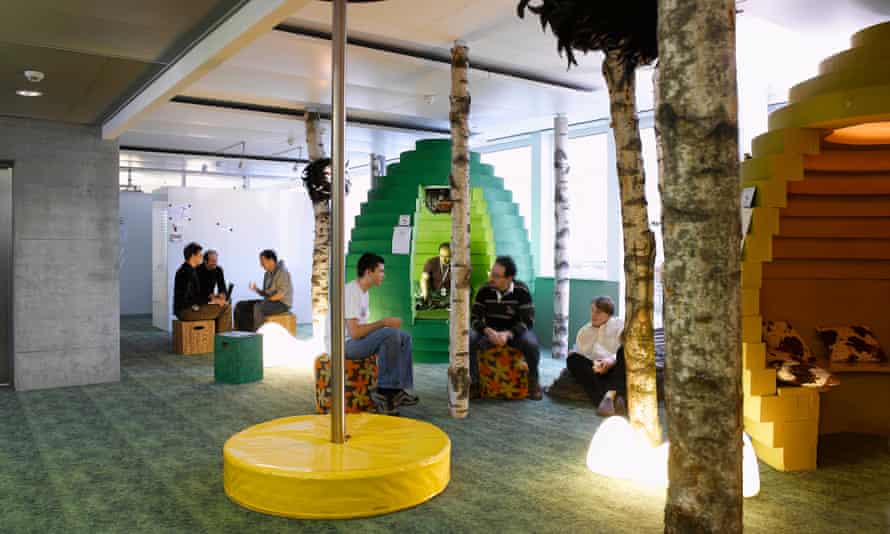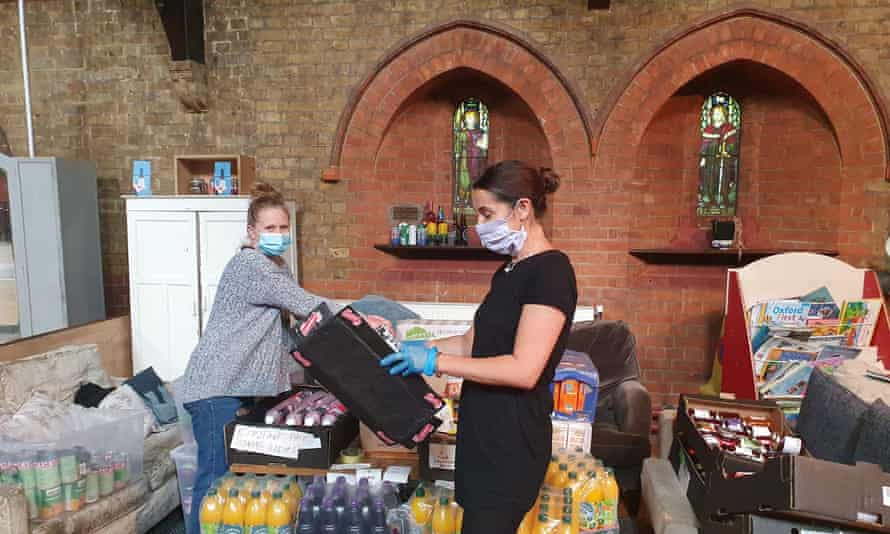In the US, they call it “hustle culture”: the idea that the ideal person for the modern age is one who is always on, always at work, always grafting. Your work is your life, and when you are not doing your hustle, you have a side-hustle. Like all the world’s worst ideas, it started in Silicon Valley, although it is a business-sector thing, rather than a California thing.
Since the earliest days of tech, the notion of “playbour”, work so enjoyable that it is interchangeable with leisure, has been the dream. From there, it spiralled in all directions: hobbies became something to monetise, wellness became a duty to your workplace and, most importantly, if you love your work, it follows that your colleagues are your intimates, your family.
Which is why an organisation such as Ustwo Games likes to call itself a “fampany”. “What the hell is that?” says Sarah Jaffe, author of Work Won’t Love You Back. “A lot of these companies’ websites use the word ‘family’, even though they have workers in Canada, workers in India, workers in the UK; a lot of us don’t even speak the same language and yet we’re a ‘family’.” Meanwhile, companies such as Facebook and Apple have offered egg-freezing to their employees, suggesting that you may have to defer having a real family if you work for a fake one.
 A grownup soft-play area: inside the Google office in Zurich, Switzerland. Photograph: Google
A grownup soft-play area: inside the Google office in Zurich, Switzerland. Photograph: GoogleThe tech companies’ attitudes have migrated into other “status” sectors, together with the workplaces that look like a kind of grownup soft-play, all colourful sofas and ping-pong and hot meals. In finance, food has become such a sign of pastoral care that Goldman Sachs recently sent junior employees hampers to make up for their 100-hour working weeks. If you actually cared about your staff, surely you would say it with proper working conditions, not fruit? But there is an even dicier subtext: when what you eat becomes your boss’s business, they are buying more than your time – they are buying your whole self.
Then Elon Musk weighed in to solve that niggling problem: what’s the point of it all? Making money for someone else, with your whole life? The billionaire reorientated the nature of work: it’s not a waypoint or distraction in the quest for meaning – work is meaning. “Nobody ever changed the world on 40 hours a week,” he memorably tweeted, concluding that people of vision worked 80 or more, eliding industry with passion, vision, society. Say what you like about him but he knows how to build a narrative.
Hustle culture has proved to be a durable and agile creed, changing its image and language while retaining its fundamentals. Sam Baker, author of The Shift: How I (Lost and) Found Myself After 40 – And You Can Too, worked an 80-hour week most of her life, editing magazines. “The 1980s were, ‘Put on a suit and work till you drop,’” she says. “Mark Zuckerberg is, ‘Put on a grey T-shirt and work till you drop.’” The difference, she says, is that “it’s all now cloaked in a higher mission”.
What has exposed the problems with this whole structure is the pandemic. It has wreaked some uncomfortable but helpful realisations – not least that the jobs with the least financial value are the ones we most rely on. Those sectors that Tim Jackson, professor of sustainable development at Surrey University and author of Post Growth: Life After Capitalism, describes as “chronically underinvested for so long, neglected for so long” and with “piss-poor” wages, are the ones that civilisation depends on: care work, retail, delivery.
 Elon Musk … ‘Nobody ever changed the world on 40 hours a week.’ Photograph: Brendan Smialowski/AFP/Getty Images
Elon Musk … ‘Nobody ever changed the world on 40 hours a week.’ Photograph: Brendan Smialowski/AFP/Getty ImagesMany of the rest of us, meanwhile, have had to confront the nonessentiality of our jobs. Laura, 43, was working in private equity before the pandemic, but home working brought a realisation. Being apart from colleagues and only interacting remotely “distilled the job into the work rather than the emotions being part of something”. Not many jobs can take such harsh lighting. “It was all about making profit, and focusing on people who only care about the bottom line. I knew that. I’ve done it for 20-odd years. I just didn’t want to do it any more.”
Throw in some volunteering – which more than 12 million people have during the pandemic – and the scales dropped from her eyes. She ended up giving up her job to be a vaccination volunteer. She can afford to live on her savings for now, and as for what happens when the money runs out, she will cross that bridge when she comes to it. The four pillars of survival, on leaving work, are savings, spouses, downsizing and extreme thrift; generally speaking, people are happiest talking about the thrift and least happy talking about the savings.
Charlotte White, 47, had a similar revelation. She gave up a 20-plus-year career in advertising to volunteer at a food bank. “I felt so needed. This sounds very selfish but I have to admit that I’ve got a lot out of it. It’s the opposite of the advertising bullshit. I’d end each day thinking: ‘My God, I’ve really helped someone.’ I’ve lived in this neighbourhood for years, and there are all these people I’ve never met: older people, younger people, homeless people.”
With the spectre of mortality hovering insistently over every aspect of life, it is not surprising that people had their priorities upended. Neal, 50, lost his job as an accountant in January 2020. He started applying for jobs in the same field. “I was into three figures; my hit rate was something like one interview for 25. I think I was so uninterested that it was coming across in my application. I was pretending to be interested in spreadsheets and ledgers when thousands of people were dying, and it just did not sit right.” He is now working in a psychiatric intensive care unit, earning just above the minimum wage, and says: “I should have done it decades ago. I’m a much better support worker than I ever was an accountant.”
This is a constant motif: everybody mentions spreadsheets; everyone wishes they had made the change decades ago. “For nine months, my partner and I existed on universal credit,” Neal says, “and that was it. It was tough, we had to make adjustments, pay things later, smooth things out. But I thought: ‘If we can exist on that …’”
 The tyranny of work … Could change be its own reward? Photograph: Bob Scott/Getty Images
The tyranny of work … Could change be its own reward? Photograph: Bob Scott/Getty ImagesSo why have we been swallowing these notions about work and value that were nonsense to begin with, and just getting sillier? We have known that the “higher mission” idea, whether it was emotional (being in a company that refers to itself as a “family”) or revolutionary (being “on” all the time in order to change the world) was, as Baker puts it “just fake, just another way of getting people to work 24 hours a day. It combined with the email culture, of always being available. I remember when I got my BlackBerry, I was working for Cosmopolitan, it was the best thing ever … It was only a matter of months before I was doing emails on holiday.”
But a lot of status came with feeling so indispensable. Unemployment is a famous driver of misery, and overemployment, to be so needed, can feel very bolstering. Many people describe having been anxious about the loss of status before they left their jobs; more anxious than about the money, where you can at least count what you are likely to have and plan around it. As Laura puts it, “not being on a ladder any more, not being in a race: there is something in life, you should always be moving forward, always going up”. And, when it came to it, other people didn’t see them as diminished.
Katherine Trebeck, of the Wellbeing Economy Alliance, is keen to broaden the focus of the productivity conversation. “To be able to have the choice, to design your own goals for your own life, to develop your own sense of where you get status and esteem is a huge privilege; there’s a socio-economic gradient associated with that level of autonomy,” she says. In other words: you have to have a certain level of financial security before your own emotional needs are at all relevant.
“When I was at Oxfam, we worked with young mothers experiencing poverty,” Trebeck says. “Just the pressure to shield their kids from looking poor made them skimp on the food they were providing. Society was forcing them to take those decisions between hunger and stigma.” She is sceptical about individual solutions and is much more focused on system change. Whether we are at the bottom or in the middle of this ladder, we are all part of the same story.
Part of the scam of the productivity narrative is to separate us, so that the “unskilled” are voiceless, discredited by their lack of skill, while the “skilled” don’t have anything to complain about because if they want to know what’s tough, they should try being unskilled. But in reality we are very interconnected – especially if working in the public sector – and you can burn out just by seeing too closely what is going on with other people.
Pam, 50, moved with her husband from London to the Peak District. They were both educationalists, he a headteacher, she in special educational needs (SEN). She describes what drove their decision: “If you think about a school, it’s a microcosm of life, and there have been very limited resources. Certainly in SEN, the lack of funding was desperate. Some kids just go through absolute hell: trying to get a CAMHS [Child and Adolescent Mental Health Services] appointment is nigh on impossible, kids have to be literally suicidal for someone to say: ‘OK, we’ll see you in two months.’”
They moved before the pandemic, and she found a part-time job with the National Trust, before lockdown forced a restructure. She hopes to resume working in the heritage sector when it reopens. Her husband still does some consultancy, but the bedrock of their security, financially speaking, is that the move out of London allowed them to “annihilate the mortgage”.
 A rewarding alternative … volunteers working at a foodbank in Earlsfield, south London. Photograph: Charlotte White/PA
A rewarding alternative … volunteers working at a foodbank in Earlsfield, south London. Photograph: Charlotte White/PACreative and academic work, putatively so different from profit-driven sectors, nevertheless exploits its employees using, if anything, a heightened version of the same narrative: if what you do is who you are, then you’re incredibly lucky to be doing this thoughtful/artistic thing, and really, you should be paying us. Elizabeth, 39, was a performer, then worked in a theatre. “My eldest sister used to be an archaeologist, and that sounds different, but it’s the same: another job where they want you to be incredibly credentialed, incredibly passionate. But they still want to pay you minimum wage and God forbid you have a baby.”
There is also what the management consultants would call an opportunity cost, of letting work dominate your sense of who you are. You could go a whole life thinking your thing was maths, when actually it was empathy. I asked everyone if they had any regrets about their careerist years. Baker said: “Are you asking if I wish I’d had children? That’s what people usually mean when they ask that.” It actually wasn’t what I meant: whether you have children or not, the sense of what you have lost to hyperproductivity is more ineffable, that there was a better person inside you that never saw daylight.
When the furlough scheme came in, Jennifer, 39, an academic, leapt at the opportunity to cut her hours without sacrificing any pay. “I thought there’d be a stampede, but I was the only one.” She makes this elegant observation: “The difference between trying 110% and trying 80% is often not that big to other people.”
If the past year has made us rethink what skill means, upturn our notions of the value we bring to the world around us, fall out of love with our employers and question productivity in its every particular, as an individual goal as well as a social one, well, this, as the young people say, could be quite major. Certainly, I would like to see Elon Musk try to rebut this new consciousness in a tweet.
No comments:
Post a Comment